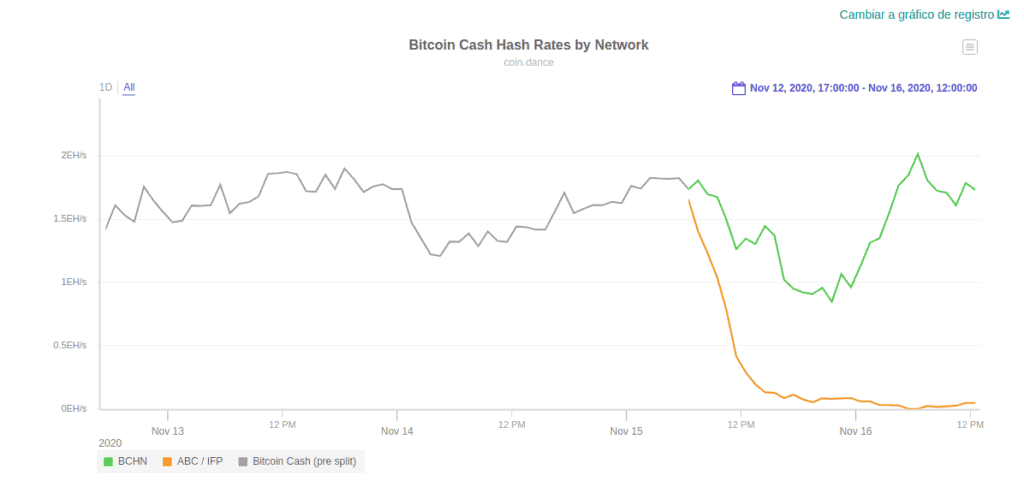
Bitcoin Cash, the cryptocurrency born from a hard fork in Bitcoin, has just undergone its second hard fork, giving rise to a new blockchain.
So far, the price of BCH on the markets has remained stable after the hard fork, even shows a growth of 4,1% in the last 24 hours at the time of writing this note. Although, on the other hand, the deposited BCH funds in Grayscale's investment fund have decreased since the community learned that this fork would occur, losing about $1,6 million in value.
The hard fork that Bitcoin Cash suffered on November 15 separated this network again blockchain into two parts, giving rise to a new blockchain. The developers of this cryptocurrency announced days ago that the cause of this separation was the lack of consensus on the network to undergo a new update that seeks to change the cryptocurrency's difficulty adjustment algorithm, and which took place on November 15. In addition, the update implements a proposal called «Coinbase Rule», presented by the Bitcoin ABC development group, led by the leading BCH developer Amaury Sechet, which seeks to impose on miners the rule of allocating 8% of their earnings to the creation of a development fund controlled by the developer. According to Sechet, this fund is necessary to finance developers and push Bitcoin Cash to become a truly universal payment network.
Much of the community disagrees with this proposal, stating that developers should do their work voluntarily and seek sources of funding elsewhere and not in the resources earned by miners for their work.
It may interest you: Critical bug hits Bitcoin SV multisigs
The protagonists of the dispute
The developer groups involved in this dispute are: Bitcoin Cash Node (BCHN), which has so far benefited from the support of miners and the BCH community and which eliminates the payment of this 8% in its source code and Bitcoin ABC (BCHA), whose blockchain only has 8 blocks mined so far.
The dispute between two groups of developers caused great controversy in the crypto community, to the point that many classified it as a power dispute and not one originating from technical aspects. Even Vitalik Buterin, co-founder of Ethereum, tweeted on his account that “their algorithm is fine as is,” noting that he did not understand the BCH community’s concern about such adjustments, as he believed they were mere “trifles.”
Coinbase and AntPool, the end and the beginning of a blockchain
The last block mined in Bitcoin Cash before the blockchain split was mined by Coinbase and was block number 661647; while the block that started the blockchain split into two parts was mined by the AntPool mining pool.
As data provider Coin Dance shows, the BCHN pool is being favored by both the community and mining pools. cryptocurrency. So far, BCHN has a total of 170 mined blocks above BCHA, which only has a total of 8 mined blocks. Mining pools such as BTC.com, AntPool, ViaBTC, Bitcoin.com, and BTC.top are placing their stakes hash rate a provision from BCHN and abandoning operations for BCHA.

Source: Coin Dance
At press time, BCHN has 1,74 EH/s of mining power, while BCHA has only 0,04 EH/s. Most of the blocks mined so far on BCHN have been mined by the mining pool. BTC.top, at over 45,9%, followed by viaBTC with 17,5%; AntPool with 13,3% and Bitcoin.com with 8,7%.
The future of “Bitcoin Cash” and “BCH”
Bitcoin ABC recently posted on its blog that will transfer the domain name of BitcoinCash.org, known as the official website of the cryptocurrency, although it is committed to continuing to develop reliable software for Bitcoin ABC nodes.
“We will focus on continuing to provide reliable and thoroughly tested Bitcoin Cash node software while allowing others to oversee the BitcoinCash.org domain and associated assets.”
On the other hand, the lack of support and availability of nodes and hash rate for this development group may end in the "disappearance" of BCHA, as already predicted by several users on Twitter. Likewise, some exchanges are expressing their support for BCHN as the dominant blockchain, with more than 95% of the blocks mined in its favor. The name Bitcoin Cash and BCH could be adopted by the BCHN development group, according to the report. Roger Ver, CEO of Bitcoin.com
A fork full of forks
As we mentioned earlier, Bitcoin Cash (BCH) is the product of a hard fork that took place in 2017 on the Bitcoin network, the world's first cryptocurrency, when part of the community clung to the idea of increasing the block size. As consensus was not reached, the network split, giving rise to BCH, which became the first direct fork that the Bitcoin network suffered.
On the other hand, in Bitcoin Cash the developers maintain an update process that occurs every 6 months and that allows the community to maintain consensus on the direction and development that the network is taking. In 2018, the lack of consensus in BCH gave rise to a new cryptocurrency, known as Bitcoin Satoshi Vision or BSV. This cryptocurrency was born as a much faster and cheaper alternative to Bitcoin Cash transactions, although to achieve this it sacrificed several of the basic technical characteristics essential to guarantee the security of the funds and which currently puts the integrity of the investors and holders of this cryptocurrency at risk.
At the time of this edition, Bitcoin Cash maintains a price of $249,01 USD, down more than $20 USD after its monthly high above $271 USD.
Continue reading: The Ethereum blockchain suffers an unannounced hard fork and exchanges suspend ETH withdrawals



